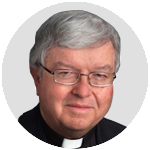
Father Kenneth Doyle
Q. I am considering coming back to the church after 50-plus years. In the meantime, though, I was married, divorced and remarried years later in a non-Catholic ceremony to a divorced man. Am I even eligible to receive the sacraments? (upstate New York)
A. Before answering, I would need to know more about your situation. Was your first marriage performed with the Catholic Church’s approval, and is your first husband still alive? Next, are you at the present time living with your second husband?
Depending on your answers, the solution could be fairly easy, requiring that you simply go to confession — or it could be a bit more complicated, involving some annulment papers and the church’s “convalidation” of your present marriage.
Why not meet with a priest whom you know or has been recommended to you and talk over your situation?
[hotblock]
I am pleased that you are thinking about coming back to the sacraments, and please know that I will pray for you as you do so.
This is not an unfamiliar story; I’ve known others who had drifted away from church attendance but who, in their later years, missed deeply the strength and peace that had come from the sacraments.
Q. I am an 80-year-old cradle Catholic, but the Mass doesn’t speak to me now. The verbiage keeps changing — what the heck is “consubstantial”? I have belonged to my parish since its inception many years ago, but if I died the priest would not know me now and has made no effort to do so, and I know only about eight people in the entire parish.
I miss the Latin Mass more than ever; when I could go anywhere and hear the same words, it was so comforting. (city and state withheld)
A. Your question reflects a familiar lament from Catholics in your age group (which, by the way, is my own age group as well). Let me separate your concerns in order to respond.
First, I agree with you on the word “consubstantial,” which is technical, heavily philosophical and puzzling to many Catholics.
This is what happened: When the current English text came into use (in 2011), the language of the Nicene Creed — which formerly had said “one in being with the Father” — was changed to “consubstantial with the Father.”
This was thought by many theologians as well as the Vatican to be a more literal and accurate translation of the language from the Council of Nicaea in A.D. 325, which had defined that doctrine.
Next, on the matter of priests knowing their parishioners, the recent history of the church, especially in the United States, has been marked by necessary parish mergers and consolidations — primarily due to the drop in priestly vocations.
Regrettably, a natural consequence is that priests are not able to know as many of their parishioners personally as they once were.
You might consider someday dropping by your rectory and simply saying hello to your parish priest, telling him that you miss the “old days” when priests had more chances to meet and get to know their parishioners.
As to the language of the Mass, I grew up in the days when it was comforting to be able to go anywhere in the world and hear the familiar sounds of the Latin Mass. But on that, I much prefer the present, when the Mass is said in the vernacular and everyone can understand what the priest is saying.
***
Questions may be sent to Father Kenneth Doyle at askfatherdoyle@gmail.com and 30 Columbia Circle Dr., Albany, New York 12203.
PREVIOUS: Divine Mercy Sunday continues the victory of Easter
NEXT: Proclaiming Jesus’ victory in what we say and do



Share this story